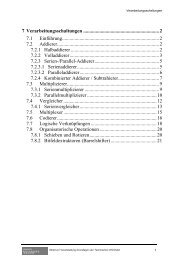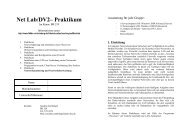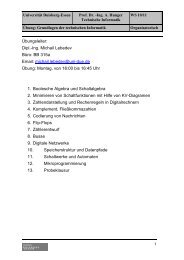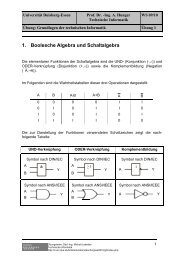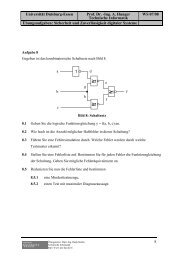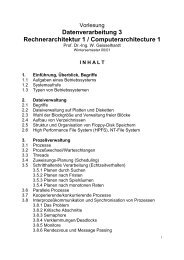Business communication in Germany
Business communication in Germany
Business communication in Germany
You also want an ePaper? Increase the reach of your titles
YUMPU automatically turns print PDFs into web optimized ePapers that Google loves.
Made by :<br />
Umer Salahudd<strong>in</strong><br />
Andrey Kravchenko
Summary<br />
� Co<strong>in</strong>tries profile<br />
� History and Culture<br />
� Social norms<br />
� Bus<strong>in</strong>es norms
Countries profile<br />
� Economy<br />
� Currency: Euro<br />
� GDP, Gross Domestic Product : 2’631<br />
billions $US<br />
� GDP per capita: 31’950 $US<br />
� Unemployment rate: 9.8%<br />
� Capital: Berl<strong>in</strong><br />
� Area: 357’021 km 2<br />
� Full name: Bundesrepublik Deutschland<br />
� Population: 82’210’000
History
1. Germania BC
2. The Frankish Empire<br />
Frankish<br />
Empire was<br />
formed on the<br />
territory of the<br />
Western<br />
Roman<br />
empire and<br />
had succeded<br />
<strong>in</strong> add<strong>in</strong>g the<br />
Rhe<strong>in</strong> tribe.
3. Holy Roman Empire
4. Napolionic <strong>Germany</strong>
5. German Empire
6. <strong>Germany</strong> after WW1
7. <strong>Germany</strong> after WW2
� Hardwork<strong>in</strong>g<br />
� Punctual<br />
� Stress on money<br />
� <strong>Bus<strong>in</strong>ess</strong> is less<br />
<strong>in</strong>fluenced by<br />
personal<br />
relationships<br />
West VS. Ost<br />
� More ”Lazy”<br />
� Also punctual, but<br />
not require<br />
punctuality from<br />
others<br />
� Respect human<br />
relationships<br />
� Relationships may<br />
play major role
German culture<br />
� Music (Bach, Beethoven, Wagner,<br />
Strauss, Orff)<br />
� Literature (Luther, Goethe, Schiller)<br />
� Philosophy (Kant)<br />
� Cuis<strong>in</strong>e (Bratwurst, Berl<strong>in</strong>ers)<br />
� Architecture<br />
� Sports (2006 w<strong>in</strong>ter olympics, 2006 WM)<br />
� Education
Social norms
Introductions
Introduction<br />
� With<strong>in</strong> an organization, the <strong>in</strong>dividual of higher rank is<br />
responsible for <strong>in</strong>troduc<strong>in</strong>g anyone who is new to the group.<br />
For example, a tra<strong>in</strong>ee would be <strong>in</strong>troduced to his or her new<br />
colleagues by his supervisor or his mentor. A new professional<br />
employee would be <strong>in</strong>troduced by his or her manager.<br />
� Note, however, that rank refers to an <strong>in</strong>dividual's professional<br />
position <strong>in</strong> the corporate hierarchy, and not his or her seniority<br />
at a company. For example, <strong>in</strong> <strong>Germany</strong>, an older office<br />
assistant would have less rank than a young manager.
Handshak<strong>in</strong>g<br />
� The colleague higher up the corporate hierarchy always has<br />
the "handshake <strong>in</strong>itiative", or the right to offer his or her hand<br />
first.<br />
� If you approach a group of people, you should always extend<br />
your hand and <strong>in</strong>troduce yourself.<br />
� To show respect, always extend your hand to older <strong>in</strong>dividuals<br />
first.
Greet<strong>in</strong>gs<br />
Make a positive impression from<br />
the start. By stand<strong>in</strong>g up and<br />
walk<strong>in</strong>g out from beh<strong>in</strong>d your<br />
desk to greet somebody when<br />
they come to meet with you, you<br />
are express<strong>in</strong>g respect for that<br />
person. Such an action sends<br />
the message that you would like<br />
to communicate without a<br />
barrier between the two of you.
Address<strong>in</strong>g<br />
“Dr.” can be a medical or<br />
academic title, and is<br />
often used, especially<br />
among Germans, as part<br />
of their names.<br />
Accord<strong>in</strong>gly, Dr. Mart<strong>in</strong><br />
Meyer should be<br />
addressed as “Herr<br />
Doktor Meyer.
Gifts
General guidel<strong>in</strong>es by gift giv<strong>in</strong>g<br />
� In general, gift giv<strong>in</strong>g is an important symbolic gesture practiced <strong>in</strong> all<br />
cultures. However, as practiced differently from culture to culture, it is<br />
essentially a matter of know<strong>in</strong>g when to offer the gift and how large<br />
or small the value of the gift should be given the relationship.<br />
� In <strong>Germany</strong>, a small gift is polite, especially when contacts are made<br />
for the first time. Substantial gifts are not usual, and certa<strong>in</strong>ly not<br />
before a deal has been reached if you don't want your <strong>in</strong>tentions to<br />
be mis<strong>in</strong>terpreted. Even small souvenir-style gifts to thank local staff<br />
for their assistance and hospitality dur<strong>in</strong>g your stay at a company will<br />
not be expected but will always be appreciated.<br />
� Avoid giv<strong>in</strong>g substantial gifts <strong>in</strong> private. The larger the gift, the more<br />
official and public the giv<strong>in</strong>g should be.
Appreciated Gifts<br />
� For the company you are visit<strong>in</strong>g, quality pens,<br />
tasteful office items with your company logo,<br />
or imported liquor are usually safe choices.<br />
� F<strong>in</strong>e chocolates can also be an appropriate gift<br />
when you are <strong>in</strong>vited to a home.<br />
� If you decide to br<strong>in</strong>g alcohol, a good imported<br />
liquor is the safest choice.<br />
� An elegant, tasteful silk scarf can be an<br />
acceptable gift for the lady of the house.
Gifts to Avoid<br />
Cloth<strong>in</strong>g, perfumes, and other toiletries are considered far too<br />
personal to be appropriate gifts. Scarves, however, are acceptable<br />
gifts accord<strong>in</strong>g to German bus<strong>in</strong>ess protocol.<br />
Avoid br<strong>in</strong>g<strong>in</strong>g beer as a gift, s<strong>in</strong>ce many of the f<strong>in</strong>est brands <strong>in</strong><br />
the world are already produced and widely available here.
Telephon<strong>in</strong>g<br />
In <strong>Germany</strong>, it is generally customary to state your name when<br />
you answer the phone. In accordance with corporate identity<br />
trends, the customary way to answer a phone at a German<br />
company is to state the name of the company, the name of the<br />
person answer<strong>in</strong>g the phone, and a greet<strong>in</strong>g.
Appropriate dress<strong>in</strong>g
Dress<strong>in</strong>g<br />
� Germans tend to dress <strong>in</strong> more conservative, muted colors,<br />
both <strong>in</strong> bus<strong>in</strong>ess and social environments. In other words, very<br />
casual sport<strong>in</strong>g attire is seen on mostly teenagers and students.<br />
Dress shoes worn with jeans and a tastefully-coord<strong>in</strong>ated<br />
ensemble is quite normal for adult men and women.<br />
� Women should also avoid excessively ornate jewelry or<br />
display<strong>in</strong>g items of conspicuous wealth, especially <strong>in</strong> the former<br />
East <strong>Germany</strong>. The standard of liv<strong>in</strong>g <strong>in</strong> this area of <strong>Germany</strong> is<br />
still lower than that <strong>in</strong> the western part and displays of affluence<br />
can cause resentment.<br />
� Most occasions do not require a tie for men, although the<br />
upscale establishments expect both men and women to arrive<br />
well dressed.
Giv<strong>in</strong>g a presentation
General suggeston for a good<br />
presentation<br />
� For the most part, when giv<strong>in</strong>g a presentation <strong>in</strong> <strong>Germany</strong>, you<br />
don't have to worry. Depend<strong>in</strong>g on the audience, it is often<br />
acceptable to present <strong>in</strong> English, but it is always a good idea to<br />
confirm this beforehand.<br />
� Germans expect presentations to go beyond superficial<br />
<strong>in</strong>formation about a topic and to provide support<strong>in</strong>g facts for<br />
bus<strong>in</strong>ess decisions.<br />
� When you are prepar<strong>in</strong>g promotional or presentation material,<br />
be aware that German bus<strong>in</strong>esspeople are traditionally less<br />
impressed by glitzy advertis<strong>in</strong>g, illustrations, and memorable<br />
slogans.
<strong>Bus<strong>in</strong>ess</strong> d<strong>in</strong>ner
D<strong>in</strong>ner<br />
It is traditional <strong>in</strong> <strong>Germany</strong> to eat the ma<strong>in</strong> meal of the day at lunchtime,<br />
between 11:30 AM and 1:30 PM.<br />
In contrast to a long, several-course meal, a German lunch usually<br />
consists of an appetizer (usually soup), a ma<strong>in</strong> course, and a dessert.<br />
When you are attend<strong>in</strong>g a bus<strong>in</strong>ess conference, both lunch and d<strong>in</strong>ner<br />
are considered important components of the conference. Meals allow<br />
those attend<strong>in</strong>g to make personal contacts and to cont<strong>in</strong>ue discuss<strong>in</strong>g<br />
bus<strong>in</strong>ess issues <strong>in</strong> a more casual atmosphere.<br />
Patrons of restaurants are normally free to select their own tables and<br />
seat themselves. In very upscale establishments, however, guests will<br />
more likely to be shown to their seats.
Keep your distance
What germans mean<br />
You can usually go on<br />
the assumption that<br />
Germans mean<br />
exactly what they say.<br />
In <strong>Germany</strong>,<br />
<strong>in</strong>dividuals expect<br />
each other to adhere<br />
to promises - given<br />
that they are of a<br />
realistic substance.<br />
Those who do not hold<br />
to their word set their<br />
trustworth<strong>in</strong>ess <strong>in</strong><br />
great jeopardy.
Travell<strong>in</strong>g by tra<strong>in</strong>
German stereotype<br />
First impression may be false
German psychological aspects<br />
� Germans have no problems say<strong>in</strong>g “no”, “I can't”, or “This is impossible” if that is<br />
what they mean.<br />
� Germans can be quite sensitive to criticism themselves. Therefore, you should be<br />
especially aware of un<strong>in</strong>tentionally say<strong>in</strong>g or do<strong>in</strong>g anyth<strong>in</strong>g to embarrass them<br />
publicly.<br />
� Germans, generally, are very private people. Therefore, do not discuss personal<br />
matters dur<strong>in</strong>g bus<strong>in</strong>ess negotiations.<br />
� In German culture, rules of any k<strong>in</strong>d are meant to be taken seriously.<br />
� At the end of a meet<strong>in</strong>g or presentation, Germans often signal their approval or<br />
thanks by gently rapp<strong>in</strong>g their knuckles on the tabletop <strong>in</strong>stead of applaud<strong>in</strong>g.<br />
� Always make appo<strong>in</strong>tments several weeks <strong>in</strong> advance<br />
� Home is sacred. If you are <strong>in</strong>vited to a German home it is a major step <strong>in</strong> the<br />
relationships
<strong>Bus<strong>in</strong>ess</strong> norms
German bus<strong>in</strong>ess
Basic Facts about German <strong>Bus<strong>in</strong>ess</strong><br />
- <strong>Bus<strong>in</strong>ess</strong> is higly successful due to precise<br />
plann<strong>in</strong>g and the determ<strong>in</strong>ation to diversify<br />
- Germans posess highly advanced technology <strong>in</strong><br />
certa<strong>in</strong> <strong>in</strong>dustries such as Automobile <strong>in</strong>dustry,<br />
Chemical <strong>in</strong>dustry.<br />
- Small sized <strong>in</strong>dustries are much more responsive<br />
to changes <strong>in</strong> World trade and share <strong>in</strong>formation<br />
with other German <strong>in</strong>dustries which is unusual <strong>in</strong><br />
big companies e.g. Textile Industry
Aspects of German <strong>Bus<strong>in</strong>ess</strong><br />
- Excellent long term plann<strong>in</strong>g<br />
- Respect for Privacy and workspace<br />
- Employers get fr<strong>in</strong>ge benefits such as health<br />
coverage, life <strong>in</strong>surance, social security, six weeks<br />
of vacation and job security.<br />
- No or little concept of overtime.Fixed breaks<br />
dur<strong>in</strong>g work<strong>in</strong>g hours.<br />
- Everybody communicates with each other with<br />
respect e.g. „frau schmidt“<br />
- Work<strong>in</strong>g conditions and wages are generally<br />
among the highest <strong>in</strong> the world
Aspects of German <strong>Bus<strong>in</strong>ess</strong><br />
- German <strong>Bus<strong>in</strong>ess</strong>men have little understand<strong>in</strong>g of<br />
corporate image e.g. American counterparts enjoy<br />
their success by boast<strong>in</strong>g it and enjoy<strong>in</strong>g luxuries<br />
- In <strong>Germany</strong> there is a prolonged decision mak<strong>in</strong>g<br />
process everyth<strong>in</strong>g is considered <strong>in</strong> detail because<br />
Germans are known to be perfectionists and try to<br />
f<strong>in</strong>d a solution to everyth<strong>in</strong>g.<br />
- There is extreme compartmentalisation <strong>in</strong> German<br />
<strong>Bus<strong>in</strong>ess</strong> the <strong>Bus<strong>in</strong>ess</strong> is divided <strong>in</strong>to Bu<strong>in</strong>ess<br />
units (BU)<br />
- Each BU determ<strong>in</strong>es ist own goals and strategies
German Mangement System<br />
- In German bus<strong>in</strong>esses are run by two types of<br />
boards , a supervisory board (Aufsichtsrat) and a<br />
management board (Vorstand). The management<br />
board conducts day to day bus<strong>in</strong>ess and monitors<br />
firm‘s operations.The supervisory board approves<br />
major decisions and appo<strong>in</strong>ts and dismisses the<br />
management board.<br />
- The German management system has two l<strong>in</strong>es of<br />
authority the 1st one be<strong>in</strong>g the technical l<strong>in</strong>e of<br />
authority that follows def<strong>in</strong>ed cha<strong>in</strong> of command<br />
and 2nd one be<strong>in</strong>g the <strong>in</strong>formal l<strong>in</strong>e to the top.
<strong>Bus<strong>in</strong>ess</strong> etiquette
<strong>Bus<strong>in</strong>ess</strong> Etiquettes<br />
- Each person is to be adressed politely with the<br />
second name e.g Mr.Andreas Schmidt will be<br />
adressed Herr Schmidt<br />
- Germans greet each other <strong>in</strong> the office formally<br />
with “Guten Tag“ and a handshake and it is done<br />
at the beg<strong>in</strong>n<strong>in</strong>g of the day and at the end of the<br />
day.<br />
- German white-collar employees are very<br />
conscious of their rights and status and must be<br />
handeled with respect.<br />
- No direct order is to be given to a fellow employee<br />
who is your equal <strong>in</strong> office rank.
<strong>Bus<strong>in</strong>ess</strong> Etiquettes<br />
- German employees should not be over critisised<br />
because even office staff such as secretaries,<br />
assistants, and junior management personnel are<br />
tra<strong>in</strong>ed and well educated often hav<strong>in</strong>g a degree.<br />
- In <strong>Germany</strong> the secretaries are assigned and are<br />
expected to do more work than <strong>in</strong> other countries.
Communication<br />
- The <strong>communication</strong> should be direct unlike <strong>in</strong> many countries when<br />
you are criticis<strong>in</strong>g a person you start off by compliment<strong>in</strong>g the other<br />
persons work before po<strong>in</strong>t<strong>in</strong>g out the errors.but its different <strong>in</strong><br />
<strong>Germany</strong>.<br />
- Have a look at the narration below by very successful japanese<br />
executive:<br />
i have many German employees and i must make a periodic<br />
evaluation of their performance. Then i must meet with each<br />
employee and discuss his evaluation. Sometimes the German will<br />
say, „why did you give me only an average rat<strong>in</strong>g?“ I tell him, „you<br />
come <strong>in</strong> late and you are not work<strong>in</strong>g hard.“ He will say, „But why<br />
didn‘t you tell me this before?“<br />
Now i write a letter to any employee who arrives late all the time and<br />
I also give him detailed comments on his work if it is less than<br />
satisfactory.Germans pay attention to written <strong>communication</strong>s
Communication<br />
- Hence it can be seen that <strong>in</strong> German workplaces a person<br />
needs to be very clear and direct and it is advisable to do so<br />
<strong>in</strong> private. Secondly the need for written <strong>communication</strong> is<br />
needed more than verbal <strong>communication</strong>.<br />
- If some agreement is reached <strong>in</strong> <strong>Bus<strong>in</strong>ess</strong> its written down<br />
completely down to the smallest details and mostly ist<br />
explicitly mentioned what is part of the agreement and what<br />
is not.<br />
- While do<strong>in</strong>g bus<strong>in</strong>ess ist important to stick to the matter.<br />
- Avoid personal questions and <strong>in</strong>volvement because<br />
Germans do not like to share private life and often keep the<br />
private life and work apart.
Negotiat<strong>in</strong>g successfully
Negotiations<br />
- Germans feel great pride <strong>in</strong> their language and hence if your<br />
not fluent <strong>in</strong> speak<strong>in</strong>g German you should hire a professional<br />
translator whom you have briefed <strong>in</strong> grat detail.<br />
- In negotiations German approach is slow, logical and<br />
analytical, hence your presentations should be logical ,<br />
without hype and systematic.<br />
- Try to have a technial expert with you to lay technical<br />
emphasis on matters and use systematic method of<br />
negotiat<strong>in</strong>g because 60% of German managers are<br />
Eng<strong>in</strong>eers who probably have had on job managerial<br />
experience.<br />
- Dur<strong>in</strong>g Negotiations Germans keep their distance.<br />
- Germans try to get the best deal.<br />
- Be patient.It takes time to reach a f<strong>in</strong>al decision after the end<br />
of negotiations, don‘t get discouraged.
Some Tipps<br />
- It is advised to have a German Lawyer and wellplaced<br />
banker.<br />
- European bankers are much more <strong>in</strong>volved with<br />
their <strong>Bus<strong>in</strong>ess</strong> clients on a day to day basis.<br />
- The bankers have vital <strong>in</strong>formation about your<br />
<strong>in</strong>dustry and <strong>in</strong>troduce you to some important<br />
contacts and help you deal with government<br />
regulations.<br />
- The first deal may take longer time then<br />
subsequent deals as Germans prefer long-term<br />
relationships.<br />
- German Lawyer will be especially helpful as <strong>in</strong><br />
<strong>Germany</strong> there are many more labour laws and<br />
rights than <strong>in</strong> other countries hence the Lawyer<br />
would be helpful <strong>in</strong> <strong>in</strong>form<strong>in</strong>g you about the do‘s<br />
and dont‘s.
Women <strong>in</strong> german companies<br />
Ironically, <strong>in</strong> a country that helped def<strong>in</strong>e the fem<strong>in</strong>ist movement and is currently<br />
be<strong>in</strong>g led by its first female chancellor, you will run <strong>in</strong>to surpris<strong>in</strong>gly few<br />
professional women <strong>in</strong> <strong>Germany</strong>’s companies.<br />
While around 60 percent of women between the ages of 15 to 65 work outside<br />
of the home, only about 30 percent of these work <strong>in</strong> professional positions and<br />
only two-thirds work full time.
THE END










